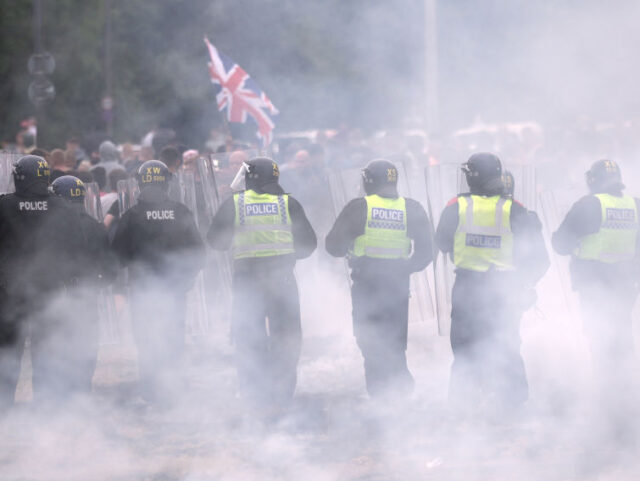Appalling violence seen in recent days is a symptom of a broken democracy, Brexit leader Nigel Farage makes implicit, stating the underlying problems behind the rioting of the past week remain unresolved.
Political leaders from across the political divide spoke out against violence on the streets of Britain overnight, but the question of where the blame lies, the underlying causes, and how to address them remains a matter of debate. While the government has moved quickly to attempt to divorce the protests in riots in England from the event which sparked them, the mass stabbing of young children a week ago, others see outrage stoked by what is stated to be nakedly political policing by the government.
Under the banner of ‘Two Tier Keir’, critics state the Prime Minister has been quick to come down hard on the riots of the past week while reacting equanimously, even with professed compassion, to other riots involving ethnic minorities rather than ethnic majority activists.
Reform UK leader Nigel Farage MP called back to when Sir Keir, as leader of the opposition, knelt for BLM rioters in 2020, and the then-Conservative government’s kid-glove approach to those protests and said: “Ever since the soft policing of the Black Lives Matter protests, the impression of two-tier policing has become widespread. The Prime Minister’s faltering attempts to address the current crisis have only added to that sense of injustice.”
In recent weeks, there have also been protests turning into riots among Britain’s Muslim community in Manchester and among the Gypsy Roma community in Leeds. As previously reported, senior lawmaker Lord Goldsmith was among those who pointed out the very changed approach to government rhetoric on the various eruptions of violence in the short month of Sir Keir Starmer’s leadership, saying they “couldn’t contrast more starkly with [previous] reactions to the Manchester riots, where violent thugs demanded instant justice ‘or else’ & where ministers bent over backwards to explain that they ‘understood’ the anger.”
“Why has the Home Office response to these two events been so different? Can they not see how this feeds the narrative of a two tier approach and drives people to the far right? It is extraordinarily shortsighted and unwise,” he said.
Britain’s Home Secretary (Interior Minister) Yvette Cooper was given the opportunity to speak out on the two-tier policing accusations on breakfast television on Monday morning, but given her own husband was one of the co-hosts, the grilling was a gentle one.
Asked about the claims, Cooper dismissed the idea that there was any difference in approaches to policing different communities whatsoever and said those who claimed otherwise were merely trying to excuse the protests of the last week. She said: “People try and use this as an excuse; they try and use this as an excuse to somehow justify the disgraceful behaviours this weekend from criminals.”
Farage’s comments on Monday morning also clearly contradicted those of the Home Secretary, who said those rioting should be engaging democratically instead. Her remarks somewhat hand-waved away the fact that parties or causes promoting the reduction of immigration came first in national elections in 2009, 2010, 2014, 2015, 2016, 2017, and twice in 2019, without those promises ever coming remotely close to being fulfilled.
Mr Farage stated: “The majority of our population can see the fracturing of our communities as a result of mass, uncontrolled immigration, whether legal or illegal. Yet to attempt to debate this in the public arena leads to immediate howls of condemnation. A population explosion without integration was always going to end badly. I have said this for many years.”
There has to be an “honest debate” about border control, he said, and crucially, the public needs to have “confidence that there are political solutions,” quite the opposite of the past decade and a half of the British democratic experience, where widespread concern about uncontrolled mass migration is scorned by the political class. The first move, Farage said, should be the Prime Minister recalling Parliament from its summer recess so he can face scrutiny from the house.
Farage’s remarks follow others last week when, again, the Reform UK leader condemned violence and held the government to account, saying it was doing nothing to address the “fear, discomfort, unease” in working-class communities after the mass knife attack. Starmer then as now threatened the full force of the law and massive retribution to rioters, stating in the wake of the slaughter of children that the “immediate challenge is driven by far-right hatred,” prompting Mr Farage to counter-point that the “far-right” is the symptom, not the cause of rioting.
He said then: “No, the far right are a reaction to fear, to discomfort, to unease that is out there, shared by tens of thousands… Let’s have proper law and order. But Mr Starmer, just to blame a few far-right thugs to say that is the root of our problems, doesn’t work.”
He continued: “Let me be clear, I don’t support street violence. I don’t support thuggery in any way at all. But I am worried, not just about the events in Southport, but about the societal decline that is happening in our country. Law and order on our streets is breaking down and this Prime Minister hasn’t got an earthly clue how to deal with it.”
Amid the discussion of what is happening and why, some figures continue to attempt to pin the violence of the past week on Nigel Farage himself. One persistent voice has been former London “woke” police chief Neil Basu who said Mr Farage had failed to keep his “mouth shut”. Labour MP Kim Johnson has called on the parliamentary standards commissioner to investigate Mr Farage, saying his words are “dangerous”, even accusing him of being “the voice of the EDL [English Defence League] in parliament”, an organisation Mr Farage has long stood against.

COMMENTS
Please let us know if you're having issues with commenting.